Soci review note chp.1
What is socialology
- social vacuum(va cu em)[社会真空]
where we can rationally and individually think through the consequences.
Our actions would not happen in a social vacuum, but in a social context in which our behavior is influenced by the people around us
|
- Key points
1.Group behavior is more than the individual decisions of each separate person. Group dynamics and the setting change the decision-making process for the individuals involved.
2.Mark Granovetter argued that events like riots can be viewed like a disease that breaks out among a small group but spreads through more and more people in the crowd. Research on protests and crowd behavior shows that people take cues from others, the response of authorities, and the setting.
sociology
The study of how societies are organized and how the
organization of a society influences the behavior of people living in it
sociological imagination
Perspective in which we think about our own personal experience in relation to a larger set of social forces that influence every aspect of our lives. (思考个人行为经历与整个社会力量(政治、经济、社会制度)的联系,社会力量如何影响你的生活)
Industrial Revolution
The rapid development in the late 1700s and throughout the 1800s of manufacturing and industry, enabled by technological changes in machinery and power sources.
Division of labor
Economic arrangement in which workers, and even entire communities, specialize in particular tasks or products, rather than producing everything they need themselves.
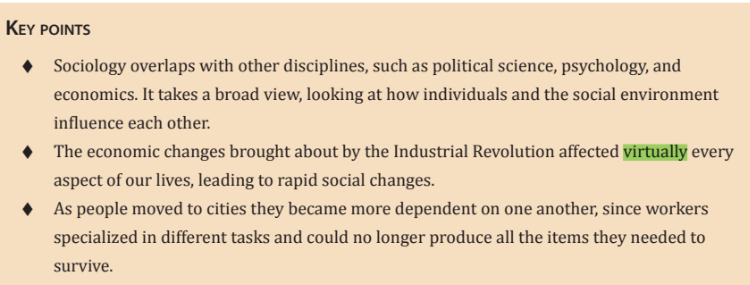
-
对小节问题的回复:
-
To think sociologically
means to look beyond individual behaviors and personal experiences to understand how broader social forces, structures, and institutions shape people’s lives. This perspective emphasizes understanding the relationships between individuals and society, recognizing patterns in human behavior, and considering how historical, cultural, and economic contexts influence personal actions and societal issues. Thinking sociologically often involves questioning taken-for-granted assumptions, exploring power dynamics, and examining how race, class, gender, and other social factors affect people’s experiences and opportunities. -
Influence of the Industrial Revolution and Urbanization on Sociology
The Industrial Revolution and the growth of cities in the 18th and 19th centuries played a crucial role in the development of sociology as a discipline. These events dramatically changed social structures and relationships:
- Economic and social upheaval: The Industrial Revolution shifted economies from agriculture-based to industrial, creating vast inequalities in wealth, working conditions, and social status. Sociologists began studying the impact of industrialization on people’s lives, especially labor exploitation, poverty, and the emergence of new social classes.
2. Urbanization: As people moved from rural areas to cities for work, urbanization led to overcrowding, poor living conditions, crime, and alienation. These challenges prompted early sociologists to explore how the rapid growth of cities affected social cohesion, community ties, and individual well-being.
3. Changes in family and community life: Industrialization and urbanization disrupted traditional family structures and community relationships, prompting sociologists to investigate how these changes influenced people’s identities, roles, and interactions.
4. Rise of new social problems: The rapid development of factories and cities created new social problems like unemployment, poor working conditions, child labor, and public health crises. Sociologists sought to understand these issues and how society could address them.
Key sociologists like Karl Marx, Émile Durkheim, and Max Weber were deeply influenced by the social changes brought about by industrialization, and their work laid the foundation for modern sociology by examining how economic systems, social structures, and institutions shape human behavior.
Founders of sociology
How did early thinkers view the role of conflict and cohesion in societies?
What did each scholar see as the driving force in society!
Karl Marx
认为所有的社会都基于社会斗争(social conflict)
是 relational sociologist
-
Social Conflict
a struggle between groups that have differing interests and needs. -
Economic relationships – How goods and resources are owned and distributed.
-
Class – A group of people with similar positions in the economy and similar needs and interests (for example, workers).
-
Labor – The ability to do work. ᇟ
-
Wages – Compensation for one’s labor. ᇟ
-
Dialectic – An ongoing struggle between opposites.
-
Relational sociology – Sociological perspective that sees individuals as defined by their relationships to others and to institutions such as the economy.
社会学的观点,认为个人是由他们与他人和机构(如经济)的关系来定义的。 -
Alienation – Feeling of being disconnected from others, from work, and even from one’s own sense of humanity.
-
Key points
ᇟ Marx saw economic relationships as the key factor that determined how a society works. He argued that all societies were based on social conflict between different classes.
ᇟ In a capitalist society, social conflict was primarily between capitalists and workers. Capitalists want to pay lower wages in order to make more profit; workers want higher wages and better working conditions. According to Marx, these two groups were always in conflict because of their differing economic interests.
ᇟ Marx believed that workers experienced widespread alienation, since they competed with other workers for jobs and had little control over their work conditions or what they produced.
姐们头疼!做不到精读!
这里放截图!
Émile Durkheim
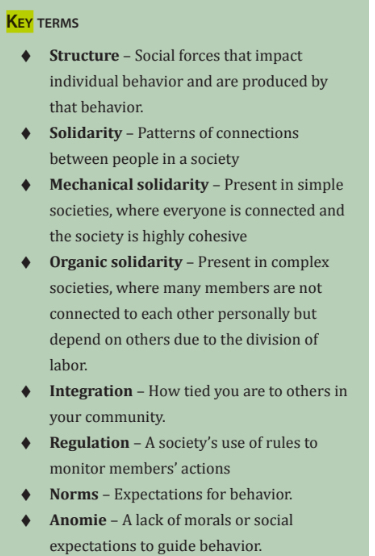
Max Weber
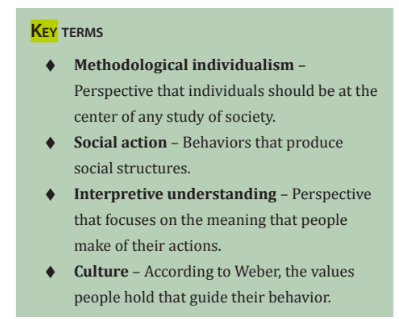
总结:
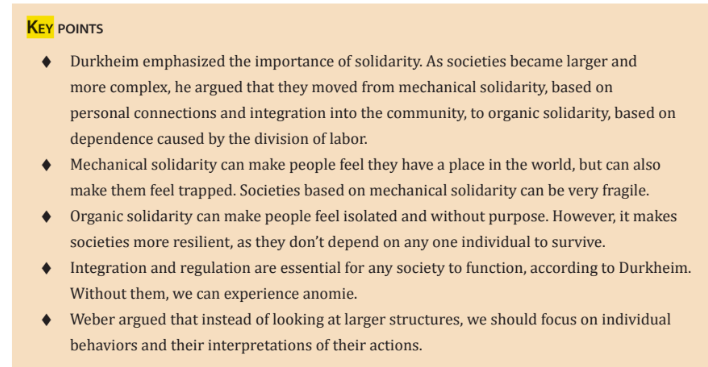

Jane Addams

黑哥哥
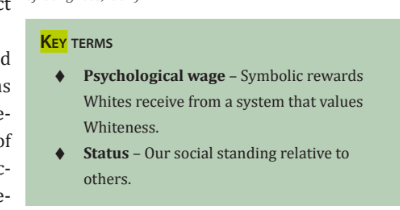
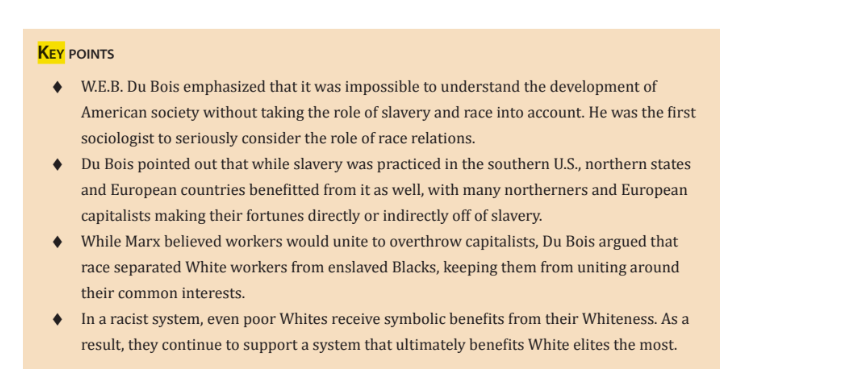
Thorstein Veblen



